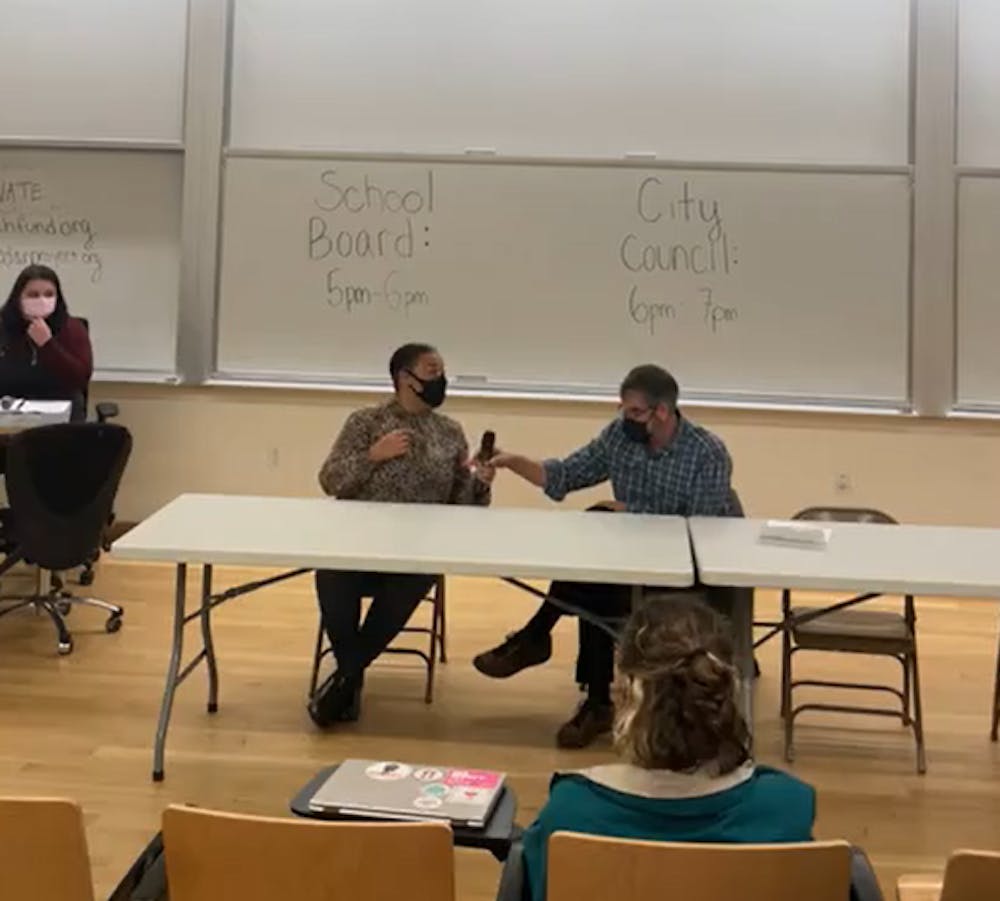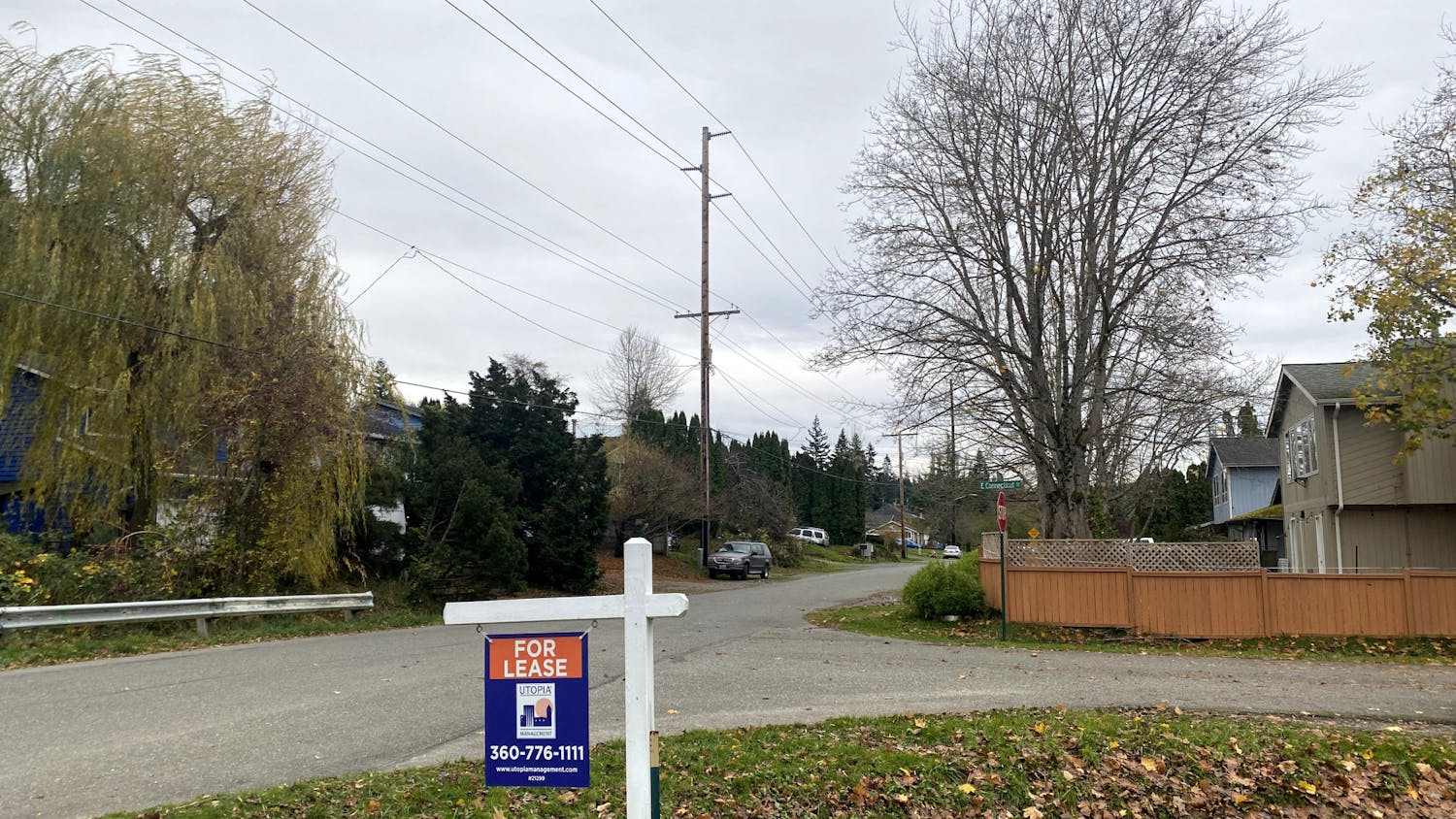On Oct. 28, Incumbent Bellingham City Councilmember Michael Liliquist and candidate Kristina Michele Martens stopped by Miller Hall and gave their final campaign pitches at a forum hosted by the Office of Student Engagement.
Neither of the candidates' opponents were present. Roughly a dozen students attended the forum, which opened with statements from each candidate before moving to an audience Q&A.
Both candidates discussed a variety of topics, touching on houselessness and social work to Bellingham’s People First Initiatives.
“I work hard, I do my homework and I put my heart into the job,” said Michael Liliquist, who’s running for re-election for the Bellingham City Council. “Now is not the time for us to let up but to move forward together, because we all are looking for a home we can afford, a job that pays well and a living planet in our future.”
Liliquist is running against Eve Smason-Marcus, a community organizer and board member of the Whatcom Human Rights Task Force.
Since Liliquist was first elected to the Bellingham City Council in 2009, he’s had his fingerprints on many of the programs brought forth by the council in recent years, such as rental assistance, affordable housing programs and boosting the budget to help the city’s houseless population.
Kristina Michele Martens is running for the at-large Bellingham City Council position against Russ Whidbee, a financial advisor and teacher of Accounting at Whatcom Community College and Bellingham Technical College.
A long-time host of a local talk show, Bellingham Tonight, the events of 2020 compelled her to become an activist in the Bellingham community, where she tackles the questions of why Black, Indigenous and people of color are in such a disadvantageous position in Whatcom County.
“How have we let it be like this for 500 years, when are we going to take a stand and demand better, and I think we’re very far past the point of asking,” she said.
People First Initiatives 1-4 were a topic of discussion during the forum. While they were brought forth by the people of Bellingham, the City Council voted unanimously to encourage voters to turn them down.
“If these were resolutions and statements of values, they would’ve been endorsed 100%. But each of these initiatives isn’t a resolution, it’s a law,” said Liliquist, who recommended that people vote against these initiatives. “And when you write a law, the actual words matter.”
In reference to Initiative 3 which is intended to protect the right for labor to organize, Liliquist said the ordinance comes across as a labor neutrality agreement, but the written law does something far different.
“The ordinance doesn’t just refer to people who contract with the city, it asserts the right to limit people’s free speech, just because [their business] receives any kind of value or service from the city,” he said.
Liliquist said that the city would have to segregate funds in order to see whether or not they’re complying with union neutrality, which he said was not a good way to write a law.
Houselessness is one of the most sensitive topics in Bellingham. One of the primary reasons Martens decided to run was to instill her own vision of how to handle the issue.
“We can offer as many shelters as possible, but we cannot make people stay there,” she said. “We need to get to the root of each individual person and find out why they are houseless.”
Martens said providing the people who help operate shelters with proper wages and resources is a way the turnover rate can be improved at shelters and encourage mental health assistance.
“What are the largest gaps that we have? And for me, that is in our boots on the ground and mental health support,” she said. “We will be in this cycle forever if we cannot offer people an actual solution to end houselessness.”
Liliquist said the problem with an unregulated houseless encampment is that it’s not an informed way to keep houseless people safe.
“I think there are exceptions that we can have for camping in parks and overnight shelters, but it has to be permitted; that’s how we keep people safe,” he said.
Liliquist said permitted alternatives for houselessness support around 95% of Bellingham’s houseless population, but there is not a way to safely put all 100% of them together in the same shelter.
“50% of people on the [transitional housing] waitlist are chronically homeless. They have a permanent disability, or an addiction, or a mental illness — they’re candidates for permanent supportive housing,” he said. “Permanent supportive housing is very expensive, but it’s cheaper, and it’s more humane than the alternative.”
Finding adequate funding for permanent supportive housing is always challenging. Liliquist said while the council hasn’t found a way to fully fund it, there is still a lot more money flowing towards that solution than there was before he was elected.
Liliquist’s campaign website can be found here.
His opponent’s website can be found here.
Martens’s campaign website can be found here and her opponent’s website can be found here.
If you still need to register to vote or fill out your ballot, students and members of the public can visit the Associated Students Voter Hub in the Viking Union Multipurpose Room until 8 p.m. today.
Jonathan Tall (he/him) started pursuing journalism at Western after getting his degree in Economics and Political Science. Interested in everything from international politics to environmental issues, you can find him reporting on city news or at the gym failing to deadlift way more than he’s able to.
You can reach him at jontall21@gmail.com






